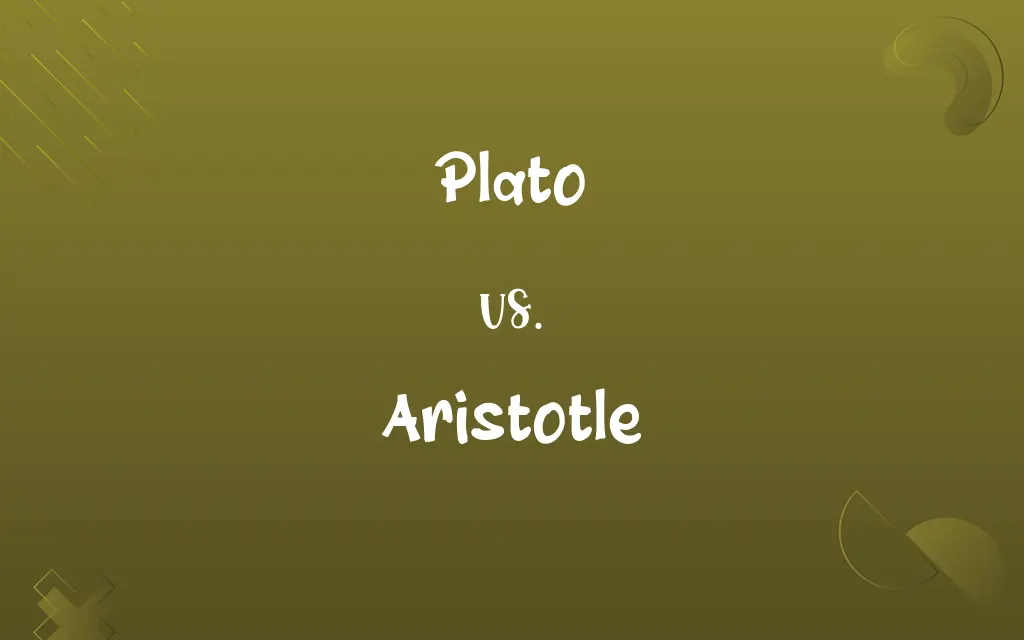Plato vs. Aristotle: Know the Difference

By Shumaila Saeed || Updated on December 25, 2023
Plato was an idealist philosopher who emphasized forms and ideas, while Aristotle was a realist focusing on empirical observation and logic.

Key Differences
Plato, a student of Socrates, is renowned for his theory of Forms, which posits that non-physical forms (or ideas) represent the most accurate reality. His work often explores these ideal forms as the truest nature of reality. Aristotle, a student of Plato, diverged from this idealism. He emphasized empirical observation and logic, focusing on the physical world and its observable phenomena.
Shumaila Saeed
Nov 17, 2023
In his philosophical approach, Plato often used dialogues to explore ideas like justice, virtue, and the ideal state. His allegory of the cave is a key example, demonstrating his belief in a higher world of unchanging Forms. Aristotle, on the other hand, systematically categorized the physical world, laying the groundwork for scientific inquiry. His works include extensive studies in biology, ethics, politics, and metaphysics, emphasizing a practical approach to knowledge.
Shumaila Saeed
Nov 17, 2023
Plato's influence on philosophy includes the development of the Academy in Athens, one of the earliest known organized schools in Western civilization. His teachings promoted the exploration of abstract concepts through rigorous dialectic methods. Aristotle, after studying at Plato's Academy, established his own school, the Lyceum. He focused more on comprehensive empirical research, and his school became renowned for its extensive collections and systematic approach to knowledge.
Shumaila Saeed
Nov 17, 2023
In political philosophy, Plato envisioned an ideal state ruled by philosopher-kings, as outlined in his work "The Republic." He believed in a hierarchical but just society governed by wisdom. Aristotle, contrarily, in his work "Politics," argued for a more practical view of governance. He analyzed various forms of government and advocated for a constitutional government, emphasizing the rule of law and the role of the middle class.
Shumaila Saeed
Nov 17, 2023
Regarding ethics, Plato believed in objective moral truths and that virtue is a form of knowledge. His view suggested that understanding the good inherently leads to good action. Aristotle’s ethical views, presented in "Nicomachean Ethics," focus on the concept of virtue ethics, emphasizing the importance of habitual action and character, and proposing that virtue lies in finding the mean between extremes.
Shumaila Saeed
Nov 17, 2023
ADVERTISEMENT
Comparison Chart
Philosophical Approach
Idealist, focused on forms and ideas.
Realist, emphasized empirical observation and logic.
Shumaila Saeed
Nov 17, 2023
View of Reality
Non-physical forms represent the most accurate reality.
Physical world and its phenomena are the basis of knowledge.
Shumaila Saeed
Nov 17, 2023
Educational Contributions
Founded the Academy, emphasizing abstract thought and dialectic.
Founded the Lyceum, prioritized empirical research and categorization.
Shumaila Saeed
Nov 17, 2023
Political Philosophy
Ideal state ruled by philosopher-kings, hierarchical society.
Advocated for constitutional government and the rule of law.
Shumaila Saeed
Nov 17, 2023
Ethical Views
Objective moral truths, virtue as knowledge.
Virtue ethics, finding the mean between extremes, focus on character.
Shumaila Saeed
Nov 17, 2023
ADVERTISEMENT
Plato and Aristotle Definitions
Plato
Ancient Greek philosopher, student of Socrates.
Plato's dialogues are fundamental texts in Western philosophy.
Shumaila Saeed
Nov 11, 2023
Aristotle
Founder of the Lyceum, a center for scientific study.
The Lyceum under Aristotle became a model for future research institutions.
Shumaila Saeed
Nov 11, 2023
Plato
Proponent of the theory of Forms.
Plato believed in ideal forms as the highest form of reality.
Shumaila Saeed
Nov 11, 2023
Aristotle
Ancient Greek philosopher, student of Plato.
Aristotle's works cover a wide range of subjects from logic to biology.
Shumaila Saeed
Nov 11, 2023
Plato
Author of works like "The Republic" and "Symposium."
Plato's The Republic explores the concept of justice and the ideal state.
Shumaila Saeed
Nov 11, 2023
ADVERTISEMENT
Aristotle
Pioneer in empirical observation and scientific methodology.
Aristotle's emphasis on observation influenced the development of science.
Shumaila Saeed
Nov 11, 2023
Plato
Influential in developing concepts of idealism.
Plato's ideas laid the groundwork for later idealist philosophies.
Shumaila Saeed
Nov 11, 2023
Aristotle
Author of "Nicomachean Ethics" and "Politics."
Aristotle's Politics analyzes various forms of government.
Shumaila Saeed
Nov 11, 2023
Plato
Founder of the Academy in Athens.
Plato's Academy was a pivotal institution in ancient philosophical education.
Shumaila Saeed
Nov 11, 2023
Aristotle
Developer of the concept of virtue ethics.
Aristotle’s ethics focus on character and finding the mean in behavior.
Shumaila Saeed
Nov 11, 2023
Plato
Ancient Athenian philosopher; pupil of Socrates; teacher of Aristotle (428-347 BC)
Shumaila Saeed
Oct 19, 2023
Aristotle
One of the greatest of the ancient Athenian philosophers; pupil of Plato; teacher of Alexander the Great (384-322 BC)
Shumaila Saeed
Oct 19, 2023
Repeatedly Asked Queries
What is Aristotle known for?
His empirical approach to science and philosophy.
Shumaila Saeed
Nov 17, 2023
What did Plato establish in Athens?
The Academy, an early organized school.
Shumaila Saeed
Nov 17, 2023
What school did Aristotle found?
The Lyceum, known for its research and empirical focus.
Shumaila Saeed
Nov 17, 2023
What was unique about Aristotle’s Lyceum?
Its systematic approach to empirical research.
Shumaila Saeed
Nov 17, 2023
What are some of Aristotle’s key works?
Including "Nicomachean Ethics" and "Politics."
Shumaila Saeed
Nov 17, 2023
Who was Plato?
A prominent ancient Greek philosopher and student of Socrates.
Shumaila Saeed
Nov 17, 2023
How do Plato and Aristotle differ in their view of reality?
Plato emphasized ideal forms, while Aristotle focused on the physical world.
Shumaila Saeed
Nov 17, 2023
What was Aristotle’s approach to ethics?
He focused on virtue ethics and finding the mean in behavior.
Shumaila Saeed
Nov 17, 2023
Which works did Plato author?
Among others, "The Republic" and "Symposium."
Shumaila Saeed
Nov 17, 2023
What is Plato’s theory of Forms?
The idea that non-physical forms represent true reality.
Shumaila Saeed
Nov 17, 2023
How did Plato and Aristotle view politics?
Plato favored an ideal state ruled by wisdom, Aristotle advocated constitutional governance.
Shumaila Saeed
Nov 17, 2023
Did Plato believe in objective moral truths?
Yes, he linked virtue with knowledge of the good.
Shumaila Saeed
Nov 17, 2023
Did Plato’s ideas influence later philosophy?
Yes, particularly in idealism and metaphysics.
Shumaila Saeed
Nov 17, 2023
What is a key difference in their educational contributions?
Plato's focus on dialectic, Aristotle's on empirical research.
Shumaila Saeed
Nov 17, 2023
How does Aristotle's view of virtue differ from Plato's?
Aristotle emphasized habitual action and character.
Shumaila Saeed
Nov 17, 2023
Were Plato and Aristotle contemporaries?
Yes, with Aristotle being Plato's student.
Shumaila Saeed
Nov 17, 2023
Are Plato and Aristotle still relevant today?
Yes, their ideas continue to influence modern thought.
Shumaila Saeed
Nov 17, 2023
How did Plato’s Academy influence philosophy?
It emphasized abstract thought and dialectic methods.
Shumaila Saeed
Nov 17, 2023
How did Aristotle impact the development of science?
Through his emphasis on observation and categorization.
Shumaila Saeed
Nov 17, 2023
Share this page
Link for your blog / website
HTML
Link to share via messenger
About Author
Written by
Shumaila SaeedShumaila Saeed, an expert content creator with 6 years of experience, specializes in distilling complex topics into easily digestible comparisons, shining a light on the nuances that both inform and educate readers with clarity and accuracy.









































































